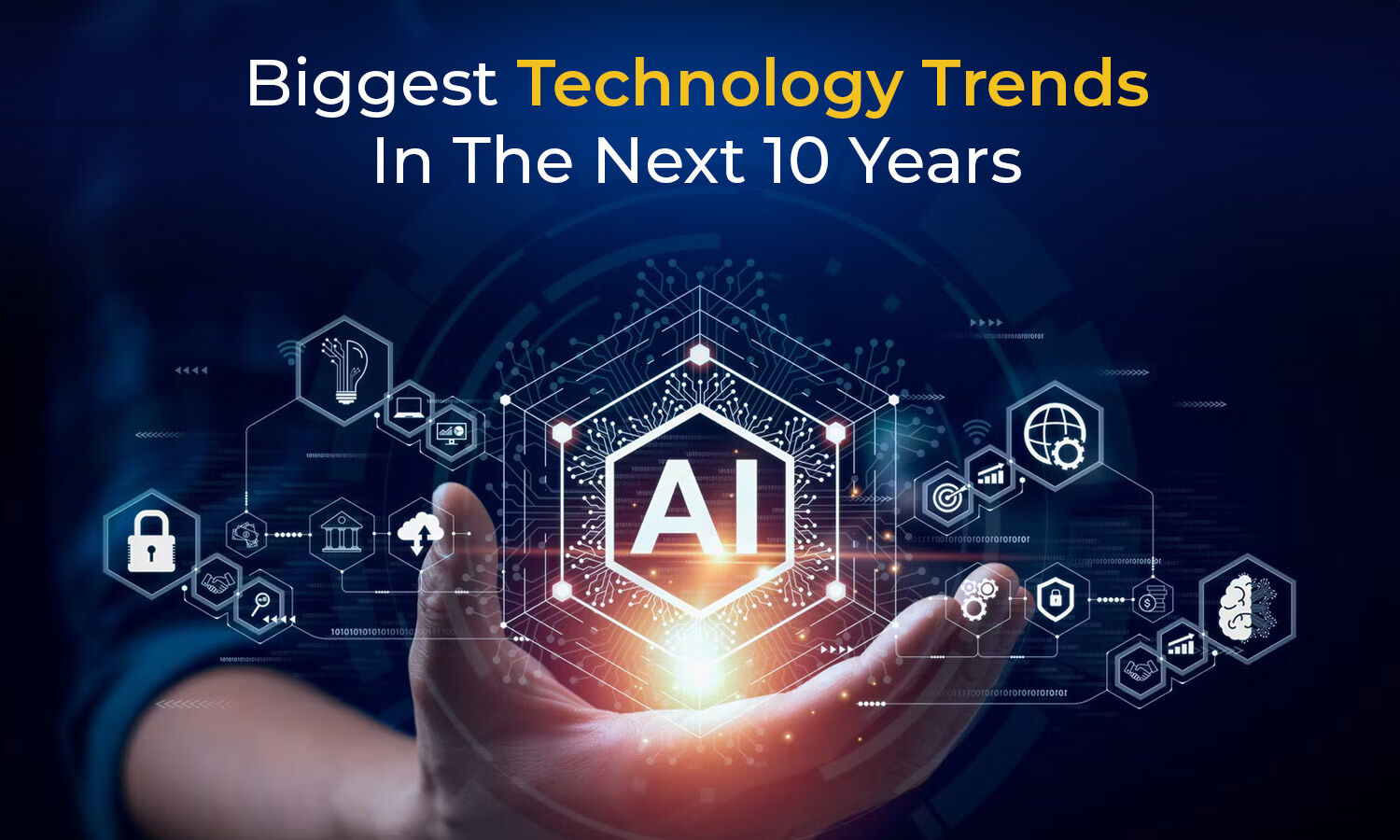The Biggest Technology Trends In The Next 10 Years :
In ten years, we will be halfway through the following decade. And, if the preceding ten years are any indication, we should expect some significant changes.
I’m used to writing about where technology trends will go in the future, but I normally focus on the next one to five years. This is due to the fact that my job entails assisting organisations in using technology and data today, which typically entails leveraging what is now accessible or coming soon.

In ten years, we will be halfway through the following decade. And, if the preceding ten years are any indication, we should expect some significant changes.
I’m used to writing about where technology trends will go in the future, but I normally focus on the next one to five years. This is due to the fact that my job entails assisting organisations in using technology and data today, which typically entails leveraging what is now accessible or coming soon.
AI And Automation Are Omnipresent:
Like previous era-defining innovations, such as fire, the internal combustion engine, electricity, and the internet, the initial excitement fades and it becomes something we take for granted.
So, while I am confident that AI will be incorporated into everything we do by 2034, we will probably not talk about it as much as we do now.
Today, we rarely consider how AI works in the background when we perform Google searches, choose films to watch on Netflix, or conduct online banking activities. Tomorrow, we won’t think about it because it powers our vehicles, keeps us healthy, and allows us to work more efficiently.
Voice control may become our default mode of communicating with machines in ten years, thanks to breakthroughs in natural language processing and speech creation. We’re already used to chatting to robots like Alexa or Siri, even if the experience is choppy and limited. However, if natural language processing takes over, having genuine, fluid conversations with technology will become entirely ordinary by 2034. And as behavioural analytics matures, our devices will be significantly more capable of knowing what we desire and forecasting what will make us happy.
Physical, autonomous robots are also gaining traction as AI is applied to difficulties like as mobility and stability. Will we see fully-fledged “androids” like those we grew up with in science fiction? We might be getting close to building robots that seem quite similar to us. But I believe it will become increasingly frequent to see machines designed for certain tasks, such as warehouse operations, manufacturing, construction, and maintenance.
In addition to the technology itself, its impact on society will be all around us. Does that imply a world in which no one works and an AI workforce produces everything we require? Or a dystopia in which humanity are essentially redundant and money becomes increasingly concentrated in the hands of a technologically advanced elite? Or something in-between? The only concrete forecast I can make here is that the actions and decisions we make today, as we get started with AI, will play a significant role in answering that issue.
Digital Lives?
More and more of our time is spent online, utilising digital services and exploring virtual worlds. There is no reason to believe that this trend will reverse as technology grows more affordable, pervasive, and immersive over the next ten years.
In reality, especially in the view of younger generations, the distinction between the online, digital world and the offline, physical world may begin to blur. The concept of the “metaverse” may have fallen out of favour in recent years, owing to the excitement surrounding generative AI. However, the assumption that our digital experiences will be just as significant and impactful as our real ones remains unchanged.
Some believe that in the next years, there may be an uprising against this. They believe that a future generation, maybe the forthcoming “generation alpha” who are all children today, would reject this outright, favouring time away from technology and firmly grounded in physical reality.
However, as virtual reality advances to the point (predicted to be around 2040) where it can create experiences that are indistinguishable from actual reality, and augmented reality seamlessly blends the best of both worlds, the allure of putting on a headset or picking up a screen is likely to remain strong for people of all ages in ten years.
Healthcare Is Transformed By Biotechnology
Ongoing discoveries and investments in sectors such as genetic engineering, personalised medicine, and stem cell research are likely to have a significant impact on how we treat and care for people in 2034.
Advances in gene editing technologies, such as CRISPR-Cas9, may have enabled the correction of many genetic abnormalities prior to birth. This could minimise the incidence of several inherited disorders, such as muscular dystrophy and cystic fibrosis. It may even lessen the general genetic tendency to the harmful effects of high cholesterol or blood pressure. This could have far-reaching societal consequences, including increased human longevity.
Similarly, regenerative medicine, fuelled by stem cell research, could mean many sections of the body will be “regrown”, making the lack of organs accessible for transplant patients and concerns over transplant rejection things of the past.
In ten years, personalised medicine may become the standard, with patients expecting healthcare practitioners to have near-complete information about their genetic identity in order to design cures and treatments that are individually suited to them.
However, all of these technologies will inevitably require us to confront a slew of ethical issues. Giving parents the ability to pick or modify genetic features in their offspring requires careful consideration of permission and equal access to this technology.